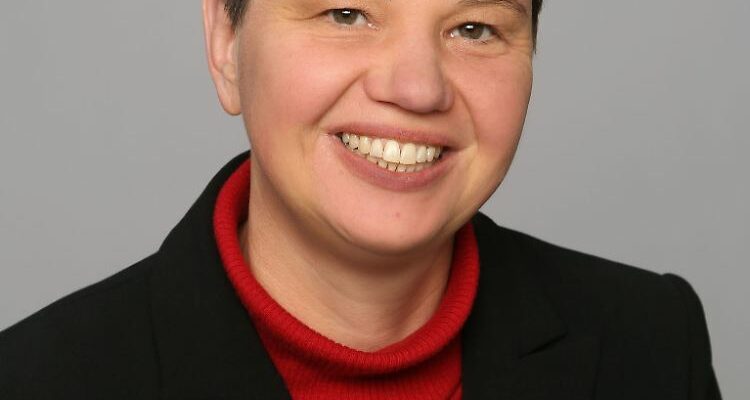Strange meeting with Weidel
“Le Pen had the chance to pass the far-right lantern”
February 27, 2024, 7:15 p.m
Marine Le Pen is the best-known right-wing populist in Europe – but she made headlines a few weeks ago by distancing herself from the AfD. The reason was the revelations surrounding the Potsdam meeting of right-wing extremists, in which AfD members also took part. Le Pen even questioned the group community in the European Parliament. According to Le Pen, she does not agree with the concept of remigration at all. Now AfD leader Weidel is kowtowing to Le Pen and insists that she is not a right-wing extremist and has plans for “remigration”. How right-wing is Le Pen anyway? The core brand of her party is still intact, says Ronja Kempin from the Science and Politics Foundation in an interview with ntv.de.
ntv.de: Ms. Kempin, the French right-wing populist Marine Le Pen has threatened the AfD with breaking up its parliamentary group in the European Parliament. Now Alice Weidel was with her and apparently apologized. What was happening?
Ronja Kempin: Marine Le Pen apparently saw the danger of being associated with these right-wing extremist remigration plans that were discussed at the meeting in Potsdam. Her party, the Rassemblement National, and the AfD are both in the Identity and Democracy group in the European Parliament. But Le Pen has been working for years to become compatible with the center and to get out of the right-wing extremist corner. I found it almost even more interesting that Alice Weidel went to Paris to kowtow to Le Pen. She then even wrote a letter to once again distance herself from the right-wing extremist meeting. There seems to be a shift in the weight of the extreme right in Europe. For a long time, right-wing extremists were particularly fond of Viktor Orban. Weidel apparently sees himself closer to Le Pen.
What does that say about Le Pen if the AfD threatens to turn too right-wing?
Le Pen is taking a completely different course than before. When she took over the party leadership in 2011, her initial concern was to de-diabolize and normalize her party, which was then still called the Front National. She purged her own ranks. Anyone who made anti-Semitic comments was forced to leave. That even included her own father, Jean-Marie Le Pen. In doing so, she celebrated success in elections. She has managed to ensure that many French people no longer feel like they have to be ashamed if they vote for her. It is also reaching more and more younger voters.

Ronja Kempin researches German-French relations in security and defense policy and the Rassemblement National and populism in France at the Science and Politics Foundation.
(Photo: SWP)
A close connection to the AfD didn’t fit into the picture?
Correct. It also gave her the chance to pass on the right-wing extremist lantern, so to speak. To Eric Zemour, who competes with her from the right and also speaks openly about remigration. And who managed to win over Marine Le Pen’s niece, Marion Maréchal, as his top candidate for the European elections in June. Marion Maréchal has long been considered Le Pen’s successor. However, there was a break between the two. Le Pen is very adept at driving her political opponents ahead of her.
Le Pen has been trying for years to erase the right-wing extremist legacy from her party. But is it really all gone? How right-wing is the Rassemblement National?
This is the crucial question that is also being discussed in France. Personally, I still consider Le Pen to be a right-wing extremist. In terms of content, it would be appropriate to describe it as National Socialist, but in German the term evokes the wrong associations. But her program has these two pillars: On the one hand, she emphasizes the national, France’s sovereignty, formulates claims to be a great power, and criticizes the EU and Germany. On the other hand, she tries to make a name for herself on social issues and economic policy issues. This is currently evident in their support for French farmers.
But only for French people.
Exactly. The motto “The French first” also applies to social benefits. Their distinguishing feature continues to be xenophobia. Although her tone has been very moderate, the party’s core brand is still intact. Of course, her voters know how critical she is of Islam and that she primarily wants to make politics for the long-established French. The majority of voters do not see themselves as right-wing extremists. They are more afraid of relegation, feel left behind and long for earlier times, when there was still a bakery on the corner and no Hypermarché. Le Pen makes them feel like he is their voice.
Is Marine Le Pen a right-wing extremist who ate chalk?
That is very difficult to assess. Just as Alice Weidel, who lives with a woman, doesn’t really fit in with the AfD, Marine Le Pen doesn’t really fit in with her party either. For example in family policy. She is divorced and has always worked. So she is by no means the housewife and mother that right-wing extremists imagine the ideal woman to be. But this also shows that these issues are not as important as hostility to Islam or the motto “France first”. Nevertheless, it is difficult to pin down Le Pen himself in positions. She always tries to stay connected to the political center. She does this very skillfully.
What is the Rassemblement National today? A kind of right-wing open CSU? An AfD without Höcke?
The AfD is taking its own example from the development of the Rassemblement National. She tries to present herself as a caretaker in rural areas, as a voice for the supposedly forgotten in East Germany and elsewhere. Le Pen has been doing this for a good 10 years. It is mainly chosen in the areas or in the suburbs of large cities. In doing so, it also benefits from the other parties’ loss of trust. In France I often hear sentences like: “I understand that people no longer have trust in the political class and are voting for Marine Le Pen because things can’t get any worse.” It’s similar with the AfD. They also benefit from the traffic light coalition’s loss of trust. An important difference, however, is that the AfD does not consistently separate itself from right-wing extremist figures. Rather, the opposite is the case.
How should we imagine the work of the Rassemblement National in the French National Assembly?
Surprisingly constructive. In the parliamentary elections in June 2022, the RN entered the National Assembly as the largest opposition faction, with 89 members. Le Pen has ordered them to behave decently, and not just when it comes to voting. Men must wear suits with ties. They shouldn’t make a fuss or attract unpleasant attention. They should adhere to parliamentary order. This has led the Macron government to accept that the Rassemblement National agrees to its plans.
Is there no firewall?
Yes and no. President Emanuel Macron and his party are not directly asking the RN for help, but they accept it if it agrees. This is a bit like the property tax reform in Thuringia last year, when the AfD agreed to the CDU project without prior agreement. In this respect, there is no such firewall in France. On the other hand, Macron says that he wants to keep Le Pen’s party small with his policies. Ultimately, this is inconsistent. That’s why people believe him less and less.
Volker Petersen spoke to Ronja Kempin
